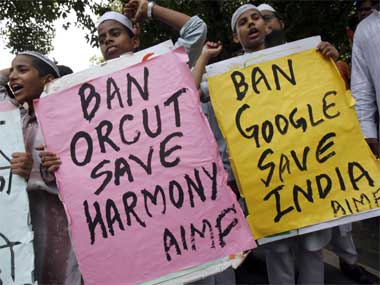Authorities in India have earned the country the dishonourable reputation of being among the world’s worst in terms of clamping down on some forms of Internet freedom, according to an index devised by the search engine Google. Between June and December 2010, Google received 67 requests for removal of content from various law enforcement agencies in India, according to the company’s Transparency Report. That’s up sharply from 30 requests in the first half of 2010. [caption id=“attachment_33405” align=“alignleft” width=“380” caption=“In India’s case, a few of the content removal requests related to content that was claimed to violate national security or which was seen to be defamatory. Adnan Abidi/Reuters”]  [/caption] Although there are a few countries that made a larger number of requests than India for removal of content from Google’s many content platforms, including YouTube and Orkut, their requests for the most part related to defamation or copyrights violations — not so much to restrictions on freedoms. In India’s case, a few of the content removal requests related to content that was claimed to violate national security or which was seen to be defamatory. But strikingly, Google also received requests to pull down content on purely partisan grounds. Google said it did not honour these requests. “We received requests from different law enforcement agencies to remove a blog and YouTube videos that were critical of Chief Ministers and senior officials of different states. We did not comply with these requests,” the Transparency Report noted. Google’s Transparency Report isn’t fully representative of the intolerance of Internet freedoms by various states: for instance, its map has gaping holes in respect of many countries that violate Net freedoms far more blatantly than India. It is nevertheless a damning statement on the creeping illiberalism within India, and is doubly damaging to India’s reputation as the world’s largest democracy that protects free speech. Overall, Indian authorities, including courts, requested Google to take down 282 items during the second half of 2010. (A single government request could cover more than one item.) Of these, the bulk (requests in respect of 133 items) related to alleged defamation; and 54 items were flagged owing to privacy and security considerations. The other heads under which content removal was sought were pornography (21 items); national security (16 items); hate speech (11 items); impersonation (2 items); and government criticism (11 items). India’s low strike rate (22%) in terms of seeing its content removal requests honoured by Google also points to an excessive eagerness on the part of authorities to clamp down on Internet freedoms. However, to put all this in its proper perspective, Indians still enjoy robust Internet freedom – and occasionally even an excess of freedoms, going by the number of outright scurrilous postings and videos that are available, which wouldn’t be tolerated in some other jurisdictions. And as compared to China, for instance, where entire services (including Google News and YouTube) are blocked – and where Google cannot even disclose the content removal requests made to it by the Chinese government earlier because they are considered “state secrets”, India fares well. Even so, for a democracy that prides itself on its freedoms, Google’s Transparency report flashes the warning that those freedoms ought not to be taken for granted.
Indian authorities’ requests to Google to remove content on its platforms, occasionally on partisan grounds, point to creeping censorship.
Advertisement
End of Article


)
)
)
)
)
)
)
)
)



